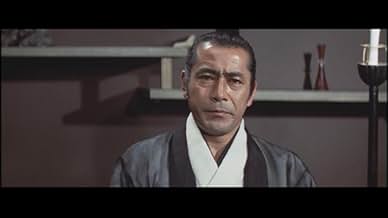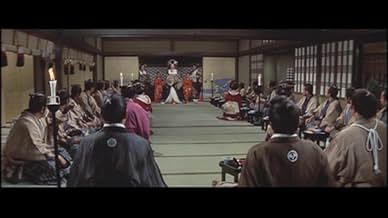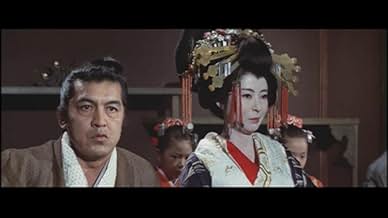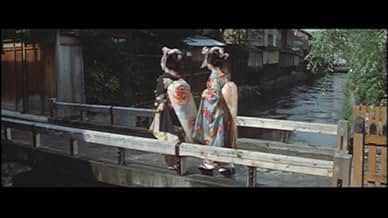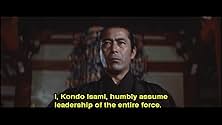Aggiungi una trama nella tua linguaFeudal Japan. Kamo Serizawa and Isami Kondo turn a collection of student fencers into a band of assassins known as the Shinsen Group, devoted to the Tokugawa shogunate and to an elegant code... Leggi tuttoFeudal Japan. Kamo Serizawa and Isami Kondo turn a collection of student fencers into a band of assassins known as the Shinsen Group, devoted to the Tokugawa shogunate and to an elegant code of action and behavior. Kondo leads the band against the forces of the Emperor in hopes o... Leggi tuttoFeudal Japan. Kamo Serizawa and Isami Kondo turn a collection of student fencers into a band of assassins known as the Shinsen Group, devoted to the Tokugawa shogunate and to an elegant code of action and behavior. Kondo leads the band against the forces of the Emperor in hopes of preventing his restoration to the throne.
- Premi
- 1 vittoria in totale
- Yasubo Katsu
- (as Ganemon Nakamura)
Recensioni in evidenza
Toshiro Mifune stars as Isami Kondo, the noble and idealistic farmer-turned-swordsman who becomes chief of the Shinsengumi, as the group is known, after killing Serizawa Kamo (played by Rentaro Mikuni), the first chief, a samurai who had become corrupt and arrogant. The film follows key events and battles in the course of the period covered, 1863-69, and the shifts in the political winds, as the Emperor soon aligns himself with pro-western forces, the Shogun withdraws from the struggle, and the Shinsengumi find themselves declared outlaws and rebels despite the fact that the group had originally formed to combat rebels opposing the Shogun. All of this is seen through the eyes of Kondo, an honest but hardened man who has imposed on his men a strict set of samurai rules which require the act of seppuku (ritual suicide) by any of them if they break a rule. As he tries desperately to hold onto his obsolete code, his world comes crashing down around him and he and his men (and Japan) pay a huge price. At some point, it all must seem supremely futile to him, yet he trudges on, following his destiny to the sad, bitter end.
The movie doesn't seem to take sides but simply presents scenes from the rise and fall of the Shinsengumi. Their values seem horribly outmoded even at the time the events are taking place and they seem to cause an awful lot of pointless death and destruction. Kondo is neither romanticized nor glamorized, although Mifune's portrayal certainly ennobles him as a sincere, loyal man who was simply swept up and engulfed in the tide of overwhelming historical and social forces that had been building up throughout the feudal era. Japanese viewers don't need a guide to the background story, since this is a piece of history that is rigorously taught in their classes. Non-Japanese viewers, however, may need to study a little before watching this film (and I don't mean watching THE LAST SAMURAI first), since it's never clear from the film what the differences are between the Shogun and the Emperor or why they're at war. Who's fighting who and why are questions not adequately answered for viewers not already familiar with the history behind the movie, so I would urge some research into the period first. There were a lot more issues at play than the question of Japan's impending modernization.
This is one of the most important Japanese samurai films, although I would hesitate to group it with such other classic samurai films as SEVEN SAMURAI, YOJIMBO, the SAMURAI trilogy, SWORD OF DOOM and SAMURAI REBELLION, to name a few. There is no adventure here, no excitement or romance. The swordplay is not intricately choreographed. It is awkward, messy, and grueling, exactly the way it would be if undertaken by farmers-turned-swordsmen, even though they have trained in swordplay for years under Kondo. One of the new recruits is an accountant from an affluent family whose fate is particularly heart-wrenching and provides the turning point of the film.
It's all masterfully photographed and staged, complete with a somber music score by veteran composer Masaru Sato. This is a film that should be seen by all those interested in Japanese cinema and Japanese history. I would particularly like to single this film out for fans of the Japanese animated TV series, "Rurouni Kenshin," and its made-for-video prequels (marketed in the U.S. as "Samurai X"), all of which touch on, in some way or other, the turbulent period covered by this movie. I should also point out that a live-action TV series entitled "Shinsengumi," on the same subject, premiered on Japanese TV in 2004.
The film starts out well by including the ugliness of the Wolves of Mibu period. Hijikata is portrayed in a very dark way. Toward the end, Kondo actually says that Hijikata did all the dirty work so that Kondo could keep his hands (and soul) clean. Even though the Shinsengumi are the heroes, there is a point where you will be yelling at Hijikata to commit seppuku. The shogunate is a mess and you end up rooting for Kondo's devotion to the shogunal party at the same time that you want the shogunate to dry up and blow away. The film manages to be nuanced and yet get you jumping up and down yelling at your television.
The production is beautiful, everything that you would want a samurai film to be. The costumes of the Shinsengumi are semi-accurate, unlike the beautiful but wrong ones in Gohatto. Although the pattern is correct in this film, the real colors were much more lurid. In real life, they must have looked like a troop of murderous peacocks as they charged through Kyoto. The exterior shots are gorgeous and the interior shots are lovely as well, although everybody seems to have brand new tatami at every point throughout the movie.
Firstly, although the Roshigumi (Ronin Corps) were formed to protect the Shogun during a journey to Kyoto to discuss recent political divisions with the Emperor, when they arrived at Kyoto their leader revealed that he actually wanted to take the Imperial side rather than the Shogunate side. This is why Kondo and the others split and formed the Shinsengumi (Newly Selected Corps).
Secondly, although Kondo and some of the others were former farmers, they were all expert swordsmen. Kondo himself had been adopted into a samurai family and was headmaster of the Shieikan Dojo which taught Tennen Rishin style swordsmanship and several of his high ranking students and instructors had joined him in the Roshigumi and Shinsengumi. One in particular, Okita Soji is universally recognised as a "genius swordsman".
Other than that I completely agree with the other reviews - this is a film well worth watching!
Lo sapevi?
- QuizThis film is part of the jidaigeki (period drama) genre, and it is also a chanbara (sword-fighting) film.
I più visti
Dettagli
- Data di uscita
- Paese di origine
- Lingua
- Celebre anche come
- Shinsengumi: Assassins of Honor
- Aziende produttrici
- Vedi altri crediti dell’azienda su IMDbPro
- Tempo di esecuzione2 ore 2 minuti
- Mix di suoni
- Proporzioni
- 2.35 : 1
Contribuisci a questa pagina


